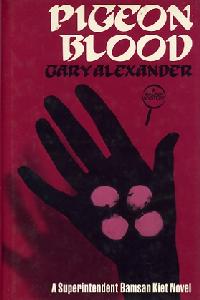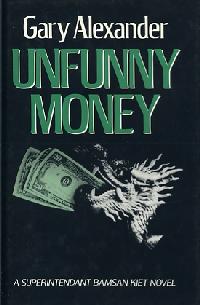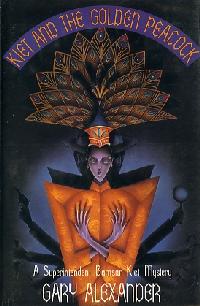Gary Alexander's Bamsan Kiet novels
Pigeon Blood
[A Superintendent Bamsan Kiet Novel]
New York: Walker and Company, 1988
182 pages, hardcover
Unfunny Money
[A Superintendent Bamsan Kiet Novel]
New York: Walker and Company, 1989
172 pages, hardcover
Kiet and the Golden Peacock
[A Superintendent Bamsan Kiet Novel]
New York: St. Martins Press, 1989
194 pages, hardcover
Kiet and the Opium War
[A Superintendent Bamsan Kiet Novel]
New York: St. Martins Press, 1990
240 pages, hardcover
Deadly Drought
[A Superintendent Bamsan Kiet Novel]
New York: St. Martins Press, 1991
240 pages, hardcover
Kiet Goes West
[A Superintendent Bamsan Kiet Novel]
New York: St. Martins Press, 1992
256 pages, hardcover
These Bamsan Kiet mysteries are contageous. Gary Alexander is a fine craftsman and humorist. None of his characters escape the reach of his social and political satire and irony. The first three novels in the series of six weigh fewer than two-hundred pages in eye-friendly print -- and the shorter, tighter stories are the sweetest.
The only way to write fiction is to make everything up -- even the name of the country. No one can blame you for mangling its culture or history, since even they are fictional. You can also write about a pathologist who does autopsies at a morturary called Blessed Sleep Funeral Home "on the corner of Avenue Che Guevara and Richard Nixon Boulevard" (Pigeon Blood, page 27).
Disclaimer
The novels include this tongue-in-cheek dislaimer immediately after, or on, the copyright page (Pigeon Blood, page v).
The author apologizes to the Socialist Republic of the Union of Burma, the People's Republic of China, the Lao[tian] People's Democratic Republic, and the Kingdom of Thailand for geographic distortions and for encroachment of their borders. Tolerance is also asked for liberties taken with the topography and the climate of the region.
Prologue
Alexander grounds his Superintendent Kiet mysteries in the tragicomic developments of postcolonial Indochina. All the novels begin with this prologue (Pigeon Blood, pages vii-viii).
Nations are created by accident or by force. The Kingdom of Luong was not. It does not exist. It is as fictional as the following events and characters, but for purposes of this story, we can presume that Luong . . .
. . . is a constitutional monarchy often referred to as the fourth Indochina protectorate.
. . . became a French colony in 1889 and was granted independence in 1954.
. . . is roughly the size and shape of Louisiana, though the toe of the boot points up, northward, nudging China. The sole and heel border Laos and Thailand. Burma surrounds the upper.
. . . is a landlocked backwater of one and a half million people. Hickorn, the capital, has a population of two hundred thousand and is in the lowlands, abutting the Ma San River. Obon, the only other city of note, has fifty thousand inhabitants and is located in the northern highlands.
. . . is mountainous in the highlands, lush and torrid in the southern river valleys.
. . . is a nominal exporter of rice, tobacco, tin, and hardwood timber. Opium gum grown in the highlands is the only cash crop of substance.
. . . is self-sufficient in agriculture. Both the ability to feed itself and the political apathy of the populace allowed the Kingdom of Luong to avoid the strife suffered by Laos, Cambodia, and Vietnam. Neighboring Marxist insurgents have had their own problems, and even the most hawkish Pentagon analysts remain unable to project the Luongan domino falling against anything. The communist Luong Rouge movement, impoverished and ignored, is relegated to the status of nuisance.
. . . is ruled by seventy-six-year-old Prince Novisad Pakse, a consummate neutralist whose abiding passion is pocket billiards.
. . . has as its Hickorn Superintendent of Police a man named Bamsan Kiet, a man who intensely dislikes being awakened from a sound sleep.
Unfunny Money
Unfunny Money grew out of a short story called "Kiet and the Inflationary Gap" (AHMM, July 1987). The just jacket describes the plot as follows.
Bamsan Kiet, police chief of the mythical Southeast Asian country of Luong, has returned from vacation in need of rest and a plate of his favorite fried shrimp. Unfortunately, all of the Luongan zin in his pocket will not suffice to buy even one pound -- a serious potential loss of face in the presence of his personal fishmonger -- because in Kiet's absence, the capital of Hickorn has been flooded with counterfeit zin. The city is in chaos as the value of the currency plummets and an inflationary gap yawns. Kiet investigates, but no one appears to know the source of the funny money that threatens peaceful Luong with anarchy.
To make matters worse, the police chief discovers a particularly brutal murder. Thank Buddha, Kiet is alone at the time, with no one to witness his squeamishness. Luongans may be gentle people, "but they would not tolerate a sissy in a position of police authority" -- hence, another serious potential loss of face.
The murder may be the key to the counterfeit riddle. Captain Binh, Kiet's American trained assistant, wants everything from APB's to a forensic team on the case, despite Kiet's preference for a more intuitive approach. Bamsan, however, is in no position to refuse help, whatever form it may take. He finds himself in pursuit of too many suspects -- from an itinerant con man to the city's mayor. Meanwhile, Kiet has been mistaken for a guru and is, in turn, being pursued by seekers of Enlightenment.
Yet, it is the chief who longs to be enlightened as to the not-so-divine secret of the Unfunny Money.
Kiet knows how to survive the divisions between Buddhists and Christians in his country. Early in his life he "made a logical compromise and entered the undemanding faith of agnosticism" -- which "spared him cafe debates on the merits of unseen deities, and more important, spared him enemies" (Pigeon Blood, page 26).
|





